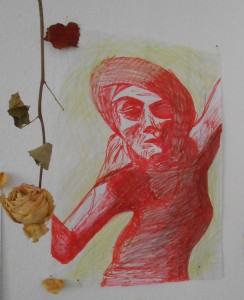 Monita Wagma, is an Islamic Scholar and radio host in Bonn, Germany.
Monita Wagma, is an Islamic Scholar and radio host in Bonn, Germany.
“My Dream for Afghan Women is a dream for all women around the world: To be empowered and to believe in themselves so that they can find confidence and raise their self- esteem, because after bringing this to their awareness, women are able to help themselves.”
*******
To define Afghan women’s different roles, we have to define their environment. In Afghanistan you have “public” and “private” space and the separation between these two is a strong one, as is usual for patriarchal societies.
“Honour” is one of the most important elements of Afghan identity and refers to men’s control over girls’ and women’s behaviour. If they behave in any way that endangers a family’s honour, the society will question a man’s authority. Simply stated, girls and women are the property of men. Their roles are extremely traditional (housewife, mother, mother-in-law) though changes are noticeable in Kabul.
We see how awareness of women’s rights is rising, though gender is a very delicate topic in Afghanistan. Changes like the adoption of CEDAW or Resolution 1325 are exemplary, but these laws didn’t captivate the minds of the people because they didn’t come from the minds of the people.  Change must come from the society itself and Afghans will be able to change their situation only when they are become fully aware of their situation.
To combat against the challenges Afghan women face, these basic needs must first be met: Security, Health and Economic Stability.  Once these are met we can look further to see that Afghan society needs perspective on their current situation in order to escape it. Beyond digesting the experience of war, Afghanistan needs stability within it’s own system of law to limit arbitrariness. Education is also necessary. If urban women are educated, they can share their knowledge with rural women, limiting the needs for foreign education and providing these women with independence.
To change attitudes in Afghanistan, religious authorities and family elders need to be reached. Muslim identity is the common identity Afghans have, therefore when elders and religious leaders begin to adjust their thinking, so too can the younger generations. To do this, mediation and communication in villages and the mosques, schools, tea houses and institutions of the cities must take place.
For Afghan women to develop their futures, they must first have access the services needed to deal with their problems. Medical or psycho-social staff are needed to help them understand themselves better and provide the language and education needed to accomplish this. Another important necessity are *Networks* to empower and connect women in their strengths, such as handcrafts. This will allow women to work together and export products to other countries.
My aspiration for Afghan women is for them to be empowered and to believe in themselves so that they can find confidence and raise their self-esteem.
Watch Monita Wagma’s “My International Women’s Day’s Dream For Afghanistan” Video
0 Comments